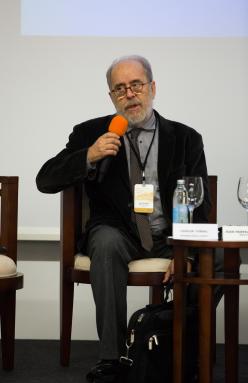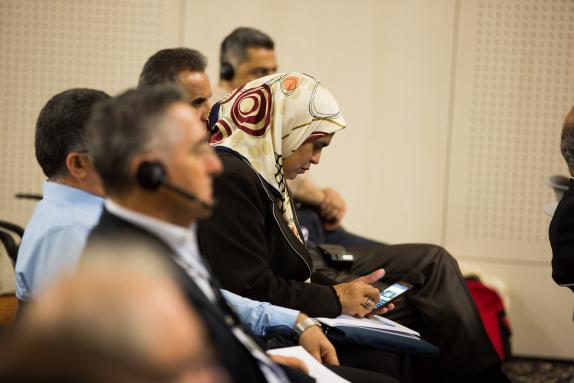The Conference was composed of the MedCities Steering Committee, the meeting of MedCities General Assembly, and an international seminar entitled “Historic city centers: heritage, innovation and social cohesion”.
As agreed by the Steering Committee of MedCities held on April 21st in Tetuan (Morocco), the Medcities Annual Conference took place on 10-11 November 2015, in Dubrovnik (Croatia) with the support of the City of Dubrovnik.
The Croatian Association of Historic Towns held its General Assembly on November 9th, the day before the MedCities Annual Conference. Mr. Andro Vlahusic, the Mayor of Dubrovnik, is its President.
More than 35 cities of the North and South shores of the Mediterranean represented by mayors and elected officials participated in the MedCities General Assembly 2015.
The event was opened with the interventions of Andro Vlahušić, mayor of Dubrovnik, Mohamed Idaomar, MedCities president and mayor of Tetuan and Alfred Bosch, vice-President of the Barcelona Metropolitan Area, which hosts the General Secretariat of MedCities.
The most rellevant decision of the General Assembly was the approval of the new Secretary General of the network Xavier Tiana, also responsible for Barcelona Metropolitan Area International Relations Department since January 2014. Formerly, he was Head of the European Cooperation Office of the Barcelona Provincial Council, and Director of the Cabinet of the Síndic Major (President of the Audit Office) from the Sindicatura de Comptes of Catalonia. He has a Degree in Political Sciences-International Relations, Master in European Studies and a Postgraduate in Local Government.
The Assembly thanked all the efforts done by Joan Parpal, former Secretary General, during the 25 years of the network.
An interesting debate on urban challenges in the Mediterranean took place among the members of the network and with the support of the analysis done by the Barcelona Center of International Affairs – CIDOB, which presented a document with some interesting inputs and ideas to discuss.
Another relevant issue that was discussed during the General Assembly was the presentation of the 25th-year campaign that will take place during 2016, with a new logo for the network and the organization of different activities.






INTERNATIONAL SEMINAR
As agreed by the Steering Committee of MedCities held on April 21st in Tetuan (Morocco), the Medcities General Assembly 2015 took place on 11 November. This edition of the international seminar was addressed to the representatives of local administrations in the Mediterranean region and the Adriatic and was part of the MedCities Annual Conference 2015, in Dubrovnik (Croatia) with the support of the City of Dubrovnik.
MedCities is willing to provide tools to its members and others policymakers and experts interested in the subject in order to achieve sustainable urban development and promote policies and practices that are adequate to the needs of citizens. Taking into consideration the importance of the historic centres of the cities members of MedCities and the current challenges that the historic centres represent for the city, in terms of urban planning, economic development, preservation of heritage, quality of life and social cohesion, this seminar focused on generating debate and exchanging experiences and good practices from all shores of the Mediterranean basin.
The aim was to present innovative interventions in the historic centres of the region regarding cross-cutting issues and discuss the challenges and risks faced by the municipalities.
The issues to be discussed were:
The discussions led to some common thoughts among participants that were highlighted at the end of the seminar.
In reference to the integration of the historic cities in the territory where they belong, participants considered it as a multi-sector space that needs a comprehensive strategy. This comprehensive planning goes beyond the reform and cultural heritage management, and it must ensure the welfare and quality of life of the inhabitants of old centers, facing social, cultural, economic, and environmental challenges.
Discussing about the regeneration of historic centres, all participants agreed on the importance of political leadership and the good governance, with the strong engagement of local stakeholders and civil society.
Concerning tourism and the economic activities linked to it, they were considered as an opportunity but considering the risk of the possible adverse effects that may be causing the loss of identity and the expulsion of the local community.
Some practical experiences were shared as examples on this comprehensive point of view in urban planning. These were the Stari Grad Agency from Mostar, the Safeguarding Association for the Medina of Tunis and the experience of District planning in the Old City of Barcelona.
Participants also discussed on the opportunity posed by new technologies and the digital challenge that historical cities have to face, not in technological terms but as a political project. Below, you can consult the result of the seminar. The publication MedCities publication “Historic city centers: Heritage, innovation and social cohesion” aims at synthetizing the reflections and conclusions shared by the participants. The document is available in English and French.















Subscribe to the monthly newsletter to receive the latest news.

Nam porttitor blandit accumsan. Ut vel dictum sem, a pretium dui. In malesuada enim in dolor euismod
Nam porttitor blandit accumsan. Ut vel dictum sem, a pretium dui. In malesuada enim in dolor euismod

Nam porttitor blandit accumsan. Ut vel dictum sem, a pretium dui. In malesuada enim in dolor euismod

Nam porttitor blandit accumsan. Ut vel dictum sem, a pretium dui. In malesuada enim in dolor euismod
Nam porttitor blandit accumsan. Ut vel dictum sem, a pretium dui. In malesuada enim in dolor euismod

Nam porttitor blandit accumsan. Ut vel dictum sem, a pretium dui. In malesuada enim in dolor euismod